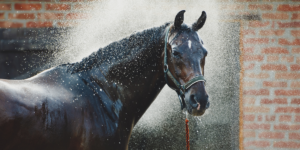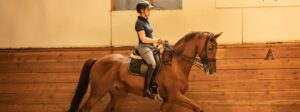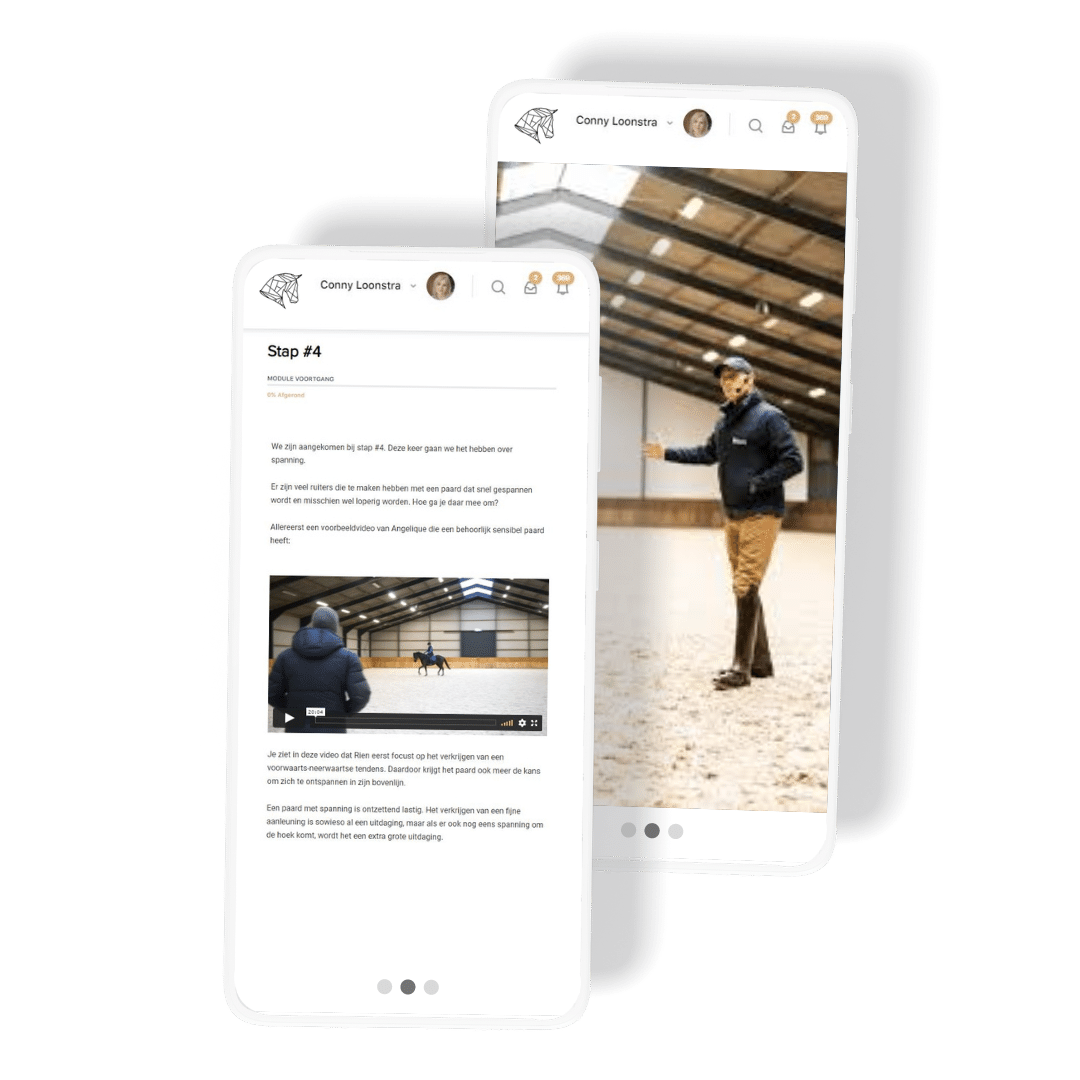6 reasons why we don’t achieve our goals
Alright, you’ve set an ambitious goal.
Perhaps you want to achieve the Advanced Level or Prix St. George.
Or maybe it’s your goal to be able to ride a test with relaxation and not, like now, that you have to voluntarily end the dressage test because your horse has panicked and the nerves have gotten the upper hand.
Whatever your goal is, you need two things.
One thing you need, to be able to achieve your goals, is the right strategy.
With strategy I mean that you need to know what it is you need to do to reach your goals.
What lessons do you have to take and how often? What are the areas of improvement? How can you increase your horse’s strength?
But with just the right strategy you don’t automatically achieve your goals.
You do need to take the steps as described in your strategy.
To actually do that, to really get into action and to stay into action, you need something else.
And that’s motivation.
Now you might think to yourself: ‘Motivation? Of course I’m motivation. I love training my horse!
To be able to achieve your goals you need the right strategy. How am I going to achieve my goals? Besides that you need motivation.
I’m sure that’s the case and I assume that your level of motivation is above average. Else you probably wouldn’t be reading this blog post.
But…
We all experience moments that we’re not that motivated.
Those moments you tell yourself that you can skip that training or that you’ll train a bit less hard. Or that the bad weather messes things up. Or when you throw yourself on the couch after a hard day at work. Or… or… or…
There are a lot of reasons that can sabotage our well-thought-out strategy.
Below I mention…
Six pitfalls you want to avoid when you want to stay motivated.
Do you recognize the following pitfalls? Read them through and think about how you’re going to avoid them.
1. You don’t truly believe you can achieve your goals
It might sound weird to set a goal you don’t believe in, but you’d be surprised to see how often that actually happens. However, we often don’t realize it when we do it ourselves.
Therefore I would like to ask you to imagine achieving your goal. Try to have a vivid imagination. How does it feel to achieve your goal?
If you notice you’re having any doubts about achieving your goals, ask yourelf whether your doubts are justified.
Why wouldn’t you be able to achieve your goals? Or instead, why are you able to achieve your goals?
Decide for yourself whether you’re having limiting beliefs that hold you back.
2. You’re doing it for someone else
Why do you want to achieve your goals and what motivates you?
Sometimes we can be led by extrinsic rewards, like for example getting more status(?) or acknowledgement when you achieve a certain level or when you win a competition. Or what about how proud it will make your parents.
It’s all human to have those icentives, but it can give more satisfaction when the motivation comes from within yourself. We call that intrinsic motivation.
So ask yourself, how important is your goal to you personally? What pleasure do you get from it and why?
3. What do you have to give up?
Dressage takes up a lot of your free time.
So that means you have to give up on something when you set an ambitious goal. Unfortunately there is not more than 24 hours in a day.
If you want to achieve your goals, you will have to make choices related to how you spend your time and money. Dressage costs time and money.
But this also applies to your expenses. If you spend money on your horse, you can’t spend it on something else.
In other words, you have to make choices related to how you spend your time and money if you want to achieve your goals.
For example, you may need to take more lessons so that you won’t have that new fancy leather jacket in your closet.
But are you prepared to make those “sacrifices” and are you even aware of what it is you that need to give up?
It helps when you think of all the choices you need to make in order to achieve your goals.
4. It takes a long time before you can reap the benefits
Another pitfall can be that you believe it will take a long time before you’ll be rewarded for your efforts. That belief can be very demotivating, because you need to put in the effort right now.
Maybe you have to train your horse in bad weather or have to get out of your comfort zone so that you can reap the benefits in a later point of time.
To overcome this make sure you get rewarded for your efforts on regular basis. Of course it’s already a reward in itself when you and your horse are making progress, but this can be a bit less tangible when you’re visualising your test every evening.
So celebrate your efforts and the tiny steps of progress.
5. It feels like you’re not in control
Do you actually have the feeling that you’re in full control of reaching your goals? Or do you feel that it’s in the hands of other people?
In the first place you’re dependent of your horse, but what about the rest?
If you have the feeling that you don’t really have control over the results, so that it doesn’t really matter if you try hard, it might demotivate you to pursue your goals.
Try stating your goals in such a way that they don’t depend on others.
6. The people around you don’t support you
It is of importance that the people around support your goals. Of course you decide how you want to live your life, but when your partner pulls a face when you’re, once again, heading off to the stables, you might decide to stay at home the following evening.
Or when you feel that your hobby is putting a strain on your family, you won’t really enjoy spending time training your horse.
It is very valuable when your environment supports you in achieving your goal. To improve the situation, have good conversations about it and make good agreements about how much time and money it will cost.





11 Responses
I have a 4 year old QH I want to take for a trail ride and join the local trail riders club ….but as he has bucked me off once before five months ago at home …I nervous about trying …I’m of mature age how do I go about teaching him. at home now ..indoor arenas and clinics he’s fine …but I really want to trail ride with safety worrying about a big shy and buck .
Buy and airvest (Hit air / Point 2). They are fantastic inventions and cushion many many falls (obviously they won’t prevent all injuries, but they prevent many esp very painful cracked ribs). Basically you wear a vest, it attaches to the saddle with a lanyard. If you fall off a CO2 canister inflates the vest protecting your back , neck and torso from injury. As a teenager I used to figure I wasn’t riding enough if I wasn’t falling off once a month. It never bothered me and never hurt much. Now it most definitely does. The airvest has given me the confidence to ride out on a rather … lets say forward going… warmblood despite being self employed and the sole income earner.
Hi Trish.
I was thinking….. Do you know a young valmue rider that can help taking your horse on a hike the first times?
He might be happy going outside the arena the first times, but whit a relaxed rider that wount be a problem. Then both you and your horse can enjoy the trairides afterwords.
Best of luck ????
My goal is to ride a relaxed supple horse.If I have to start at the beginning stage of contact so be it.After surviving cancer and a trainer that wouldn’t let me ride my own horse I am very motivated to ride 3 x a week .No matter what.Unless, there is a hurricane or tornado. Lol
Hey Trish.4 yr old horse is very young.Maybe have a friend pony him a few times for you.Or just hike with him a few miles.in hand.
It is hard to keep motivation and make yet another plan when the horse is lame second time in 4 months. First injury caused by a kick in the wall (annoyed by the neighbour horse during feeding) and now both front legs of unknown reasons… 1.5 week left before next test for lameness and if OK restart her slowly. Good ideas for best training with little/no trot nor gallopp is appreciated…
My motivation is right in the middle. I also feel I have a lot of pressure on me. My goal is to get my 2 last scores for my bronze medal. But I’ve been going after this goal since 2006. It’s been either tragedy, having a horse that wasn’t physically/mentally ready, or just family/life in general… I don’t have the finances to buy a horse that is already capable for the higher level. That would also go against my other dream of training a horse up the levels.
So my challenge now and what brought me here to the training plan is a 7 coming 8 yr.old Oldenburg just broke w/t under saddle on a quest to 3rd level dressage.
Wish all the luck to everyone on their training plan mission. I think support is the #1 key to motivation..
Good luck with your journey and thanks for sharing!! 🙂
I have trained my 10years old horse since he was a foal, this summer we have had our first 3rd level competition on L- level(?). I do not have other help than internet and self learning but I am willing to take next step to M-level! I want to train changes to my horse, even if I have never been riding a horse that can do them. I am sure I will do it ????.
Hi ????
I am a 54 year old woman living In Norway. I have a 9 year old dressage horse which I now compete in M level. My plan is to go all the way to GP before hi is 12. I really do not care so much about winning the copetitions than I do educating my horse.
I am really motivated to keep on training him. Maybe to much… I stick to my plan no matter what, as long as he is healthy. This spring he suddenly lost all his energy.. The vet found nothing wrong with him, so I had to change my training plans!!!!
No I just ride two days dressage before going on a trail ride and so on. I ride him 6 days a week most part of the year. My horse is happy now and therfore doing better at the dressage work. My goal is to keep him happy while reaching for GP ❤️????????
Hello Conny, absolutely love what you have done for the worldwide dressage community! Rien, Tristan and Morgan are wonderful: they have certainly transformed my interactions with horses and I bet many, many others. I have a different take on the goals thing. For me it can so easily be about human aspiration and given that everthing we do is in partnership with these amazing creatures, I find that every day, every hour and every moment, I have to adjust constantly. Maybe just doing the best we possibly can every moment, every hour and every day with our horses, is as much as we can do and all the rest will follow. xxx